The Comprehensive Guide to Platinum Plumbing: Ensuring Your Home's Plumbing is in Top Shape
NT
When it comes to the comfort and functionality of your home, few systems are as crucial as your plumbing. From ensuring clean water flows into your home to effectively removing waste, a top-notch plumbing system is essential. In this guide, we delve into comprehensive strategies to maintain and enhance your home's plumbing, ensuring everything runs smoothly.

Understanding the Basics of Plumbing
Before diving into maintenance tips, it's essential to understand the basic components of your plumbing system. This includes pipes, faucets, toilets, and water heaters. Knowing how these components work together can help you identify issues and communicate effectively with plumbing professionals when needed.
The Role of Pipes
Pipes are the backbone of any plumbing system, responsible for transporting water to and from various fixtures in your home. Regularly checking for leaks or corrosion can save you from costly repairs. Ensure that pipes are well-insulated, especially in areas prone to freezing temperatures.

Faucets and Fixtures
Faucets and fixtures are the endpoints of your plumbing system. Regular cleaning and maintenance ensure they work efficiently. Replacing washers and seals periodically can prevent drips and leaks, conserving water and reducing utility bills.
Regular Maintenance Practices
Preventative maintenance is key to keeping your plumbing system in excellent condition. Here are some practices to incorporate:
- Inspect for Leaks: Regularly check under sinks and around toilets for signs of moisture or pooling water.
- Check Water Pressure: High water pressure can damage pipes and appliances. Use a gauge to monitor it and install a pressure regulator if necessary.
- Clean Drains: Avoid using harsh chemicals; instead, use a mixture of baking soda and vinegar monthly to keep drains clear.

Water Heater Care
The water heater is a pivotal component in your home’s comfort. To ensure its longevity:
- Regularly flush the tank to remove sediment buildup.
- Check the anode rod and replace it if over-corroded.
- Set the thermostat to 120°F to prevent scalding and save energy.
When to Call a Professional
While many plumbing tasks can be handled by homeowners, certain situations require professional intervention. If you notice persistent leaks, unusual noises from pipes, or a significant drop in water pressure, it might be time to call in an expert. A professional plumber can diagnose issues accurately and provide effective solutions.

Upgrading Your Plumbing System
If your home’s plumbing is outdated, consider upgrading for efficiency and reliability. Modern plumbing fixtures not only enhance performance but also reduce water usage. Look for fixtures with the WaterSense label to ensure eco-friendliness and cost savings.
In conclusion, maintaining your home’s plumbing system through regular checks and timely upgrades is crucial for its longevity and efficiency. By following these guidelines, you can ensure that your plumbing remains in top shape, providing comfort and convenience for years to come.
